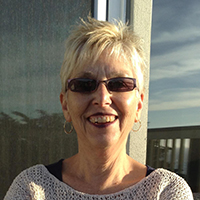Patty Somlo
I thought I was better than this. Haven’t I taught my writing students to just forge ahead, ignoring the critical voice whispering, “You’re no good?” Don’t I say that when you first sit down to write, to spew out whatever comes into your head, that you are getting stuff down and this will be the basis for a good first draft? And, yes, haven’t I said a zillion times that writing and rewriting make the work sing. It doesn’t have to be perfect the first time. That’s what I’ve said and it’s what I believe.
So, why am I in this muddle? Why am I writing and feeling disgusted with myself? Why am I comparing what I’m writing to the fantastic books I have read and reread, and feeling like my work is shit? And why do I keep thinking if I wrote a different novel, started all over from scratch, it would be better than what I’ve written?
This is why. I’m doing something new. For many years, I have written short pieces, both fiction and creative nonfiction. I have published one short story collection and have gotten publishers for two forthcoming books, an essay collection and another short story collection. It is time to work on a novel. And, boy, am I finding it hard.
Some writers plot a course and follow it from start to finish. I have never been one of those writers. I nearly always begin with the thinnest thread of an idea and do my best to follow it through the dark, usually having faith that it will lead me to a good place. I have approached writing my first novel the same way. But I’ve quickly seen what should have been obvious at the start. In a short story, the path might be dark and the destination uncertain. But the path is short. A novel is a cross-country journey, one that might take a year or a lifetime.
So every day after I finish getting down at least a few pages, I have a little talk with myself. I remind myself that even with shorter work, I often go through a phase where I hate what I’ve written. A voice in my head that has helped me through some difficult times reminds me of how often I have revised rough work multiple times and ended up with a final draft that works. Another voice that sounds like my former therapist Dr. Lori suggests I just have fun and enjoy getting to know my characters and discovering their stories. Dr. Lori also says that I shouldn’t forget to breathe and visualize the path that will lead me to the end of this novel.
I listen and nod, knowing they are right. But then the voice I call the Dark Dread tells me that no one will be interested in reading this novel. There are too many characters, he says, no romance, no violence, nothing of interest to anyone but me.
But years of living with the Dark Dread have taught me to not let it win, so I argue back. I remind DD that I’ve just started getting to know the characters and they may turn out to be folks I want to hang out with for a while. There’s Michael, who lives on the second floor of the building where all my main characters live. I picture his blond hair, after he’s gotten it spiky with gel, and I think of how I like him because he blows small problems way out of proportion the way I do. And there’s Anna on the first floor, a once-famous modern dancer who’s hiding secrets I haven’t yet had time to uncover. There’s also the mysterious boy, who suddenly showed up from who knows where, before curling up on the first floor, a few feet from Carlos’s front door.
Then the voice I think of as my Greatest Fan, who’s been there for me more times than I can count, especially in the face of rejection, brings up the novel, The Help, as she often does. “Remember the sixty rejection letters Kathryn Stockett got for The Help and she didn’t give up?” she asks.
I take a deep breath and slowly exhale. I remind myself that I can’t know at this point if my novel will be a total dud or win the Pulitzer Prize. All I know is that I love to write, even when it’s hard, and this novel is what my gut tells me I need to be working on now.
 Patty Somlo has received four Pushcart Prize nominations, been nominated for storySouth’s Million Writers Award and had an essay selected as a Notable Essay for Best American Essays 2014. Her forthcoming books are Even When Trapped Behind Clouds (WiDo Publishing), a memoir in essays, and Hairway to Heaven Stories (Cherry Castle Publishing). Her work has appeared in the Los Angeles Review, the Santa Clara Review, Under the Sun, Guernica, The Flagler Review, and numerous anthologies.
Patty Somlo has received four Pushcart Prize nominations, been nominated for storySouth’s Million Writers Award and had an essay selected as a Notable Essay for Best American Essays 2014. Her forthcoming books are Even When Trapped Behind Clouds (WiDo Publishing), a memoir in essays, and Hairway to Heaven Stories (Cherry Castle Publishing). Her work has appeared in the Los Angeles Review, the Santa Clara Review, Under the Sun, Guernica, The Flagler Review, and numerous anthologies.
